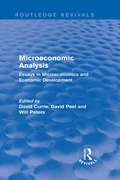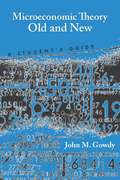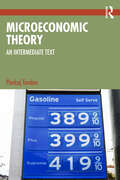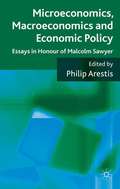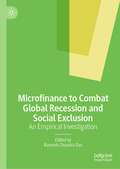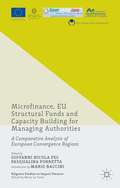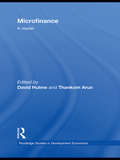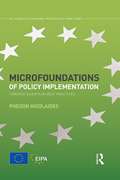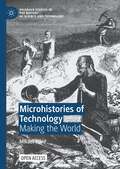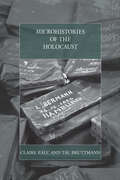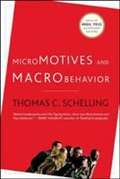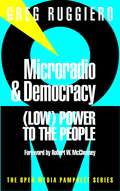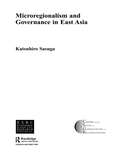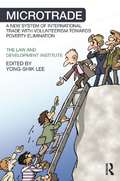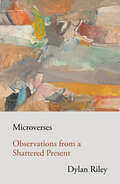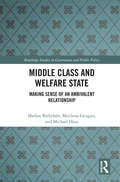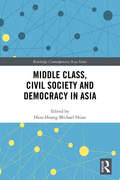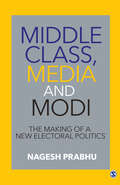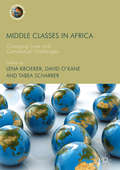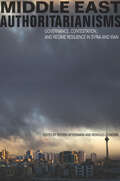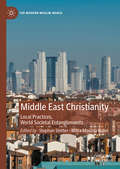- Table View
- List View
Microeconomic Analysis (Routledge Revivals): Essays in Microeconomics and Economic Development
by David Currie, David Peel and Will PetersFirst published in 1981, this book brings together a collection of essays on microeconomics and development presented at the conference of the Association of University Teachers of Economics. Topics covered include the intergenerational transfer of economic inequality, a review of the recent development in the theory of equity in the economy’s distribution and production process, labour and unemployment, market structure and international trade, taxation and the public sector, Third World industrialisation and Indian agriculture. This book will be of interest to students of Economics and Development Studies.
Microeconomic Theory Old and New
by John M. GowdyThis volume begins by explaining the basics of Walrasian general equilibrium theory, a model the author says that all contemporary economists must understand, even if they end up disagreeing with it. And Gowdy (economics, Rensselaer Polytechnic Institute) does disagree with aspects of it, as becomes apparent with even a casual reading. In the first part of the book he does a thorough, mostly objective job in explaining the underlying theories of modern economics, but does add regular comments about the assumptions and simplifications that were made in its formulation. In the second part one senses that he comes into his own, exploring theoretical and behavioral critiques of Walrasian theory and suggesting new approaches such as behavioral economics and evolutionary game theory and the necessity of incorporating the natural resource base into equations. Annotation ©2010 Book News, Inc. , Portland, OR (booknews. com)
Microeconomic Theory: An Intermediate Text
by Pankaj TandonThis book provides a comprehensive analysis of the theoretical tools, real-world applications, policy implications and corner solutions of microeconomics.It offers a discussion of all significant topics including applications and extension of consumer theory, theory of the firm, production, cost and supply, partial and general equilibrium, welfare economics, uncertainty and information, and market imperfections as well as a detailed overview of the theory of games. Apart from all the topics receiving both the algebraic and geometric treatment, the other distinguishing features of the book are an emphasis on policy implications and a full treatment of corner solutions. This latter feature has arisen out of the realization that students easily master interior solutions by memorizing the standard first-order conditions but do not necessarily understand the underlying concepts. Complete with several original algebraic derivations and graphical expositions, this book will serve as an indispensable textbook for students of microeconomics.The book will be useful to students, researchers, and teachers of economics, international economics, industrial economics, managerial economics, and agricultural economics. It will also be a useful reference for those studying public policy and law.
Microeconomics, Macroeconomics and Economic Policy
by Philip ArestisMicroeconomics, Macroeconomics and Economic Policy are at the core of research and study in economics. The essays in this volume have been specifically commissioned and brought together to celebrate the work of Malcolm Sawyer, who has made substantial contributions in these areas.
Microfinance to Combat Global Recession and Social Exclusion: An Empirical Investigation
by Ramesh Chandra DasThe book focuses on how microfinance institutions can be the alternative way to supply funds to combat different phases of global economic recessions. Also, it emphasizes upon their capabilities in reducing poverty and inequality as the countries of the world today aim to attain the goal of sustainable development. The book further deals with the challenges that the micro financial institutions may face while sustain in the competitive and vast changing global business environment. Finally, the book analyses the effectiveness of micro financial services for the emergence of micro, small and medium enterprises with new technology and innovations which, in turn, can be instrumental in ensuring new relocation of global supply chains.
Microfinance, EU Structural Funds and Capacity Building for Managing Authorities: A Comparative Analysis of European Convergence Regions (Palgrave Studies In Impact Finance)
by Pasqualina Porretta Giovanni Nicola PesMicrofinance, EU Structural Funds and Capacity Building for Managing Authorities.
Microfinance, Rights and Global Justice
by Tom Sorell Luis Cabrera Sorell, Tom and Cabrera, LuisMicrofinance - the practice of providing small loans to promote entrepreneurial activity among those with few financial assets - is increasingly seen as a sustainable means of aiding the global poor. Perhaps its most influential advocate, Nobel Laureate Muhammad Yunus, has claimed that there is a human right to microfinance, given its potential for poverty alleviation. This book directs critical philosophical attention at this very widely used and praised poverty-reducing measure. In chapters that discuss microfinance schemes and models around the world, internationally renowned contributors address important questions about both the positive impact of microfinance and cases of exploitation and repayment pressure. Exploring how far microfinance can or should be situated within broader concerns about justice, this volume sheds light on ethical issues that have so far received little systematic attention, and it advances discussion on new human rights, exploitation, and global justice.
Microfinance: A Reader (Routledge Studies in Development Economics)
by David Hulme Thankom ArunMicrofinance has become an important component of development, poverty reduction and economic regeneration strategy around the world. By the early twenty first century tens of millions of people in more than 100 countries were accessing services from formal and semi-formal microfinance institutions (MFIs). Much of the initial attention on microcredit came through work on Bangladesh’s much-lauded Grameen Bank but, there are now many different ‘models’ for microfinance and many countries have substantial microfinance sectors. This timely book, written by one of the major players in the UK in development economics explores, amongst others, topics such as: microfinance and poverty reduction microfinance, gender and social development microinsurance regulating and supervising microfinance institutions. Topical and insightful, this important text examines what has become a vast global industry employing hundreds of thousands of people and attracting the attention of large numbers of governments, banks, aid agencies, non-governmental organizations and consultancy firms.
Microfoundations of Policy Implementation: Towards European Best Practices (Routledge/eipa Managing The European Union Ser.)
by Phedon NicolaidesThe European Union (EU) has a compliance problem: there are persistent failures in the implementation of EU rules and policies by the member states. This book examines how policy implementation may be improved. It explains the nature of policy mistakes, proceeds to consider how individual public authorities and organizations can avoid making policy mistakes and then, in the light of its findings, derives how the EU may induce its member states and their public authorities to improve their compliance with EU rules and policies. Basically, this is a book about how the right incentives at national level can improve institutional performance and contribute towards more effective application of EU rules across member states without having to confer new competences to the EU. Its premise is that strengthening the capacity of organizations to learn should not only lead to better performance, but should also stimulate useful policy experimentation across the EU. Although this volume focuses on the obligations of EU membership and how to strengthen compliance, the proposed solutions have broader applicability. Improved organizational capacity for policy implementation will also be beneficial in those areas where the EU has no formal competence. Just as member states can learn from each other, so can policy officials in different policy fields. Good practices can spread.
Microhistories of Technology: Making the World (Palgrave Studies in the History of Science and Technology)
by Mikael HårdIn this open access book, Mikael Hård tells a story of how people around the world challenged the production techniques and products brought by globalization. Retaining their autonomy and freedom, creative individuals selectively adopted or rejected modern gadgets, tools, and machines. In standard historical narratives, globalization is portrayed as an unstoppable force that flattens all obstacles in its path. Modern technology is also seen as inexorable: in the nineteenth century, steamships, telegraph lines, and Gatling guns are said to have paved the way for colonialism and other forms of dominating people and societies. Later, shipping containers and computer networks purportedly pulled the planet deeper into a maelstrom of capitalism. Hård discusses instances that push back against these narratives. For example, in Soviet times, inhabitants of Samarkand, Uzbekistan, preferred to remain in—and expand—their own mud-brick houses rather than move into prefabricated, concrete residential buildings. Similarly, nineteenth-century Sumatran carpenters ignored the saws brought to them by missionaries—and chose to chop down trees with their arch-bladed adzes. And people in colonial India successfully competed with capitalist-run Caribbean sugar plantations, continuing to produce their own muscovado and sell it to local consumers. This book invites readers to view the history of technology and material culture through the lens of diversity. Based on research funded by the European Research Council and conducted in the Global South, Microhistories of Technology: Making the World shows that the spread of modern technologies did not erase artisanal production methods and traditional tools.
Microhistories of the Holocaust (War and Genocide #24)
by Claire Zalc Tal BruttmannHow does scale affect our understanding of the Holocaust? In the vastness of its implementation and the sheer amount of death and suffering it produced, the genocide of Europe’s Jews presents special challenges for historians, who have responded with work ranging in scope from the world-historical to the intimate. In particular, recent scholarship has demonstrated a willingness to study the Holocaust at scales as focused as a single neighborhood, family, or perpetrator. This volume brings together an international cast of scholars to reflect on the ongoing microhistorical turn in Holocaust studies, assessing its historiographical pitfalls as well as the distinctive opportunities it affords researchers.
Micromotives and Macrobehavior (Updated Edition)
by Thomas C. SchellingMicromotives and Macrobehavior was originally published over twenty-five years ago, yet the stories it tells feel just as fresh today. And the subject of these stories -- how small and seemingly meaningless decisions and actions by individuals often lead to significant unintended consequences for a large group -- is more important than ever. In one famous example, Thomas C. Schelling shows that a slight-but-not-malicious preference to have neighbors of the same race eventually leads to completely segregated populations. The updated edition of this landmark book contains a new preface and the author's Nobel Prize acceptance speech.
Micropolitics in the Multinational Corporation
by Christoph Dörrenbächer Mike Geppert Becker-Ritterspach, Florian A. A. and Blazejewski, Susanne and Dörrenbächer, Christoph and Geppert, Mike Becker-Ritterspach, Florian A. A. Susanne BlazejewskiOver the past decade, politics perspectives in international business have moved into the mainstream repertoire of research, theory development and teaching about the organisational behaviour of multinational corporations (MNCs). Politics perspectives contribute substantially to understanding the behaviour in and of MNCs in their different contexts and environments but so far these burgeoning perspectives have not been systematically and comprehensively reviewed. This book offers the first detailed overview of the theoretical foundations, methodologies and empirical applications of politics perspectives in MNCs. A group of international authors discuss twelve seminal contributions to the study of politics, power and conflict in MNCs, followed by a summary and synthesis of the literature into a comprehensive analytical framework. The book closes with a discussion of future directions in the field. This is a thorough introduction to political behaviour in MNCs written for scholars and graduate students in the fields of organisation studies and international business.
Microradio & Democracy: (Low) Power to the People (Open Media Series)
by Robert W. Mcchesney Greg RuggieroMicroradio and Democracy discusses the role of citizen access to communications in a democratic society, and how diversity, localism, and core political speech are undermined by corporate control of the public airwaves. Ruggiero examines the emergence of microradio activism in recent court cases, and the links between the microradio struggle and larger movements for democracy and social justice. Illustrated with photos and graphics, this book will be of interest to anyone concerned about keeping free speech for communities, not corporations.
Microregionalism and Governance in East Asia (Routledge Studies in Globalisation)
by Dr. Katsuhiro SasugaThis book provides an analysis of the processes of micro-regionalization in East Asia within the broader context of globalization and regionalization. The author examines the specifics of corporation production and investment networks that link parts of Japan, Taiwan and China with a detailed case-study focusing on the electronics industry. Making a significant contribution to the research on regionalism and multi-level governance in East Asia, this book will appeal to those interested in international political economy and Asian studies.
Microtrade: A New System of International Trade with Volunteerism Towards Poverty Elimination (Routledge Research in International Economic Law)
by Yong-Shik LeeWith contributions from well-regarded scholars of international economic law, this book sets out the case for an innovative solution to extreme poverty which utilizes international trade and its legal framework to relieve populations of the poorest countries around the world of extreme poverty. "Microtrade" is international trade on a small scale, based primarily on manually produced products using small amounts of capital and low levels of technology available at a local level in lesser developed countries. This book explores the theory, application, and legal framework for microtrade. In the first part of the book the architect of the microtrade theory, Yong-Shik Lee, offers a theoretical framework for microtrade including its basic elements, product demand and operational issues, legal issues, and the global management and facilitation of microtrade. The book then goes on to look at issues including the structure and financing of microtrade, e-commerce, government procurement, and the fair trade movement’s possible relationship with microtrade. . The final part of the book considers empirical case studies of microtrade with agricultural products. The book shows how microtrade, if effectively administered on a global scale, can do much to end extreme poverty.
Microverses: Observations from a Shattered Present
by Dylan RileyShort essays of social theory for damaged times, encompassing intellectual history, philosophy and cultureMicroverses comprises over a hundred short essays inviting us to think about society – and social theory – in new ways. Lockdown created the conditions for what Adorno once termed &‘enforced contemplation&’. Dylan Riley responded with the tools of his trade, producing an extraordinary trail of notes exploring how critical sociology can speak to this troubled decade. Microverses analyses the intellectual situation, the political crisis of Trump&’s last months in office, and love and illness in a period when both were fraught with the public emergency of the coronavirus.Riley brings the theoretical canon to bear on problems of intellectual culture and everyday life, working through Weber and Durkheim, Parsons and Dubois, Gramsci and Lukács, MacKinnon and Fraser, to weigh sociology&’s relationship to Marxism and the operations of class, race and gender, alongside discursions into the workings of an orchestra and the complicatedness of taking a walk in a pandemic.Invitations rather than finished arguments, the notes attempt to recover the totalising perspective of sociology – the ability to see society in the round, as though from the outside – and to recuperate what Paul Sweezy described as a sense of the &‘present as history&’.
Middle Church
by Bob EdgarThe radical religious right has put the wrong issues at the top of the moral agenda for America, says Bob Edgar, the general secretary of the National Council of Churches USA and a former six-term congressman. The moral issues that really matter to America's faithful majority -- to "Middle Church" -- says Edgar, are peace, poverty, and planet Earth. Middle Church is a stirring call to progressive people of faith to take back the moral high ground from the right-wing extremists and make America a better -- not a more divided -- country. The Bible seldom mentions homosexuality, doesn't mention abortion at all, but discusses poverty and peace more than two thousand times. But despite the Bible's emphasis on issues of social justice, the politics of faith have been captured in this country by a radical minority with its narrow and highly divisive agenda emphasizing personal piety above all else. This limited agenda is built around opposition to gay marriage, abortion, and stem-cell research, rather than the timeless and unifying themes of the Bible. In a stunning reversal of the historic role of religion in progressive change, faith has now been co-opted into a force for preemptive war, indifference to the poor, and reckless environmental degradation. In Middle Church, Bob Edgar reclaims faith for the American mainstream. He rebuts the distorted arguments of the far religious right and instead offers progressive solutions grounded in Scripture behind which most Americans can unite. He reminds us that Jesus preached mainly about the poor and that social justice and peace were at the heart of his ministry. Edgar agrees that all Americans have a right to bring the values of their faiths to bear on the policies of our government. But faith, as he shows, should lead to progressive solutions for the defining moral issues of our time: peace, poverty, and planet Earth. Middle Church identifies the common ground on which people of faith -- Christians, Jews, and Muslims -- can unite and shows how this faithful majority can put tolerance, social justice, and love at the top of the political agenda in this country once again.
Middle Class and Welfare State: Making Sense of an Ambivalent Relationship (Routledge Studies in Governance and Public Policy)
by Michael Haus Marlon Barbehön Marilena GeugjesThis book examines the relationship between the middle class and the welfare state. Taking an interpretive approach which understands the middle class as a socially constructed category, it combines discourse analysis, welfare state theory, and interpretive policy analysis in an innovative way to investigate how the middle class becomes a meaningful object of public debates and policymaking. Comparing Germany, Sweden, and the United Kingdom, the book reconstructs the prevalent images and meanings of the middle class from each country’s public debates and tracks how the middle classes with their various meanings and characteristics are entangled with the identification of societal problems, the articulation of political demands, and the construction of welfare policies. Ultimately, it shows how the formation and consolidation of different welfare regimes can be interpreted as specific ways of solving the puzzle of how to incorporate the middle class in the construction of a welfare state consensus. This book will be of key interest to scholars and students of comparative welfare state research, policy analysis, political sociology, political theory, and European and comparative politics.
Middle Class, Civil Society and Democracy in Asia (Routledge Contemporary Asia Series)
by Hsin-Huang Michael HsiaoThis book offers a timely analysis of the tripartite links between the middle class, civil society and democratic experiences in Northeast and Southeast Asia. It aims to go beyond the two popular theoretical propositions in current democratic theory, which emphasise the bilateral connections between the middle class and democracy on one hand and civil society and democracy on the other. Instead, using national case studies, this volume attempts to provide a new comparative typological interpretation of the triple relationship in Taiwan, South Korea, the Philippines, Indonesia and Thailand. Presenting a careful analysis and delineation of historical democratic transformation over the past thirty years, three discernible typologies emerge. Namely, there are positive links in Taiwan and South Korea, dubious links in the Philippines and Indonesia, and negative links in Thailand. Middle Class, Civil Society and Democracy in Asia will be of interest to students and scholars of Asian politics and democracy.
Middle Class, Media and Modi: The Making of a New Electoral Politics
by Nagesh PrabhuThe spectacular victory of Narendra Modi and the BJP in 2014 and again in 2019 demands a nuanced exploration of the factors that led to it. Though the role of the middle class and the media in the making of what is called the ‘Modi Wave’ is often talked about, a clear-eyed and unbiased look at how they transformed the political landscape in post-liberalization India is still wanting. This book studies how the Indian middle class, once seen as politically indifferent, has gradually become a player of importance. This change, which slowly began in the 1990s, has now reached a crescendo, and Modi has become the icon of the changing economic demands of the middle class and their ideological rightward shift. The new middle class played a decisive role in the electoral outcomes of 2014 and 2019—two elections that have undoubtedly changed the way India imagines itself and how the rest of the world sees India. Modi’s management of mainstream and social media—primary consumers of which is the ever-growing middle class—has played a key role in his emphatic victories. This book will help the reader understand the arsenal that Modi used in these elections and is a must-read for scholars of politics, media studies and sociology.
Middle Classes in Africa
by David O'Kane Lena Kroeker Tabea ScharrerThis volume challenges the concept of the ‘new African middle class’ with new theoretical and empirical insights into the changing lives in Sub-Saharan Africa. Diverse middle classes are on the rise, but models of class based on experiences from other regions of the world cannot be easily transferred to the African continent. Empirical contributions, drawn from a diverse range of contexts, address both African histories of class formation and the political roles of the continent’s middle classes, and also examine the important interdependencies that cut across inter-generational, urban-rural and class divides. This thought-provoking book argues emphatically for a revision of common notions of the 'middle class', and for the inclusion of insights 'from the South' into the global debate on class.Middle Classes in Africa will be of interest to students and scholars across a range of disciplines, as well as NGOs and policy makers with an interest in African societies.
Middle East Authoritarianisms: Governance, Contestation, and Regime Resilience in Syria and Iran
by Steven Heydemann Reinoud LeendersThe developments of early 2011 have left the political landscape of the Middle East changed but recognizable. Even as urgent struggles continue, it remains clear that authoritarianism will survive this transformational moment. The study of authoritarian governance, therefore, remains essential for our understanding of the political dynamics and inner workings of regimes across the region. The contributors to this volume consider the Syrian and Iranian regimes-what they share in common and what distinguishes them. Too frequently, authoritarianism has been assumed to be a generic descriptor of the region, and differences among regimes have been overlooked. But as the political trajectories of Middle Eastern states diverge in years ahead, with some perhaps consolidating democratic gains while others remaining under distinct and resilient forms of authoritarian rule, understanding variations in modes of authoritarian governance and the attributes that promote regime resilience becomes an increasingly urgent priority.
Middle East Avenue: Female Migration From Sri Lanka To The Gulf
by Grete BrochmannContributing to the literature on labor migration from less developed countries to the Gulf states, Middle East Avenue focuses on the case of Sri Lanka's large-scale exportation of its poorest women to serve as housemaids in private Arab homes.
Middle East Christianity: Local Practices, World Societal Entanglements (The Modern Muslim World)
by Stephan Stetter Mitra Moussa NaboDrawing from theories of world society and from historical-sociological theories the book studies the past, present, and future of Middle East Christianity. It focuses on the interplay between local practices and post-colonial entanglements in global modernity. The chapters of this book engage, inspired by these theories, key empirical dynamics that affect Middle East Christianity. This includes a historical overview on the history of Christians in the region, the relationship between Islam and Christianity, as well as case studies on the Maronites in Lebanon, Egypt’s Copts, the role of Protestant missionaries in the 19th century, processes of individualization amongst Middle East Christians, as well as papal diplomacy in the region.
